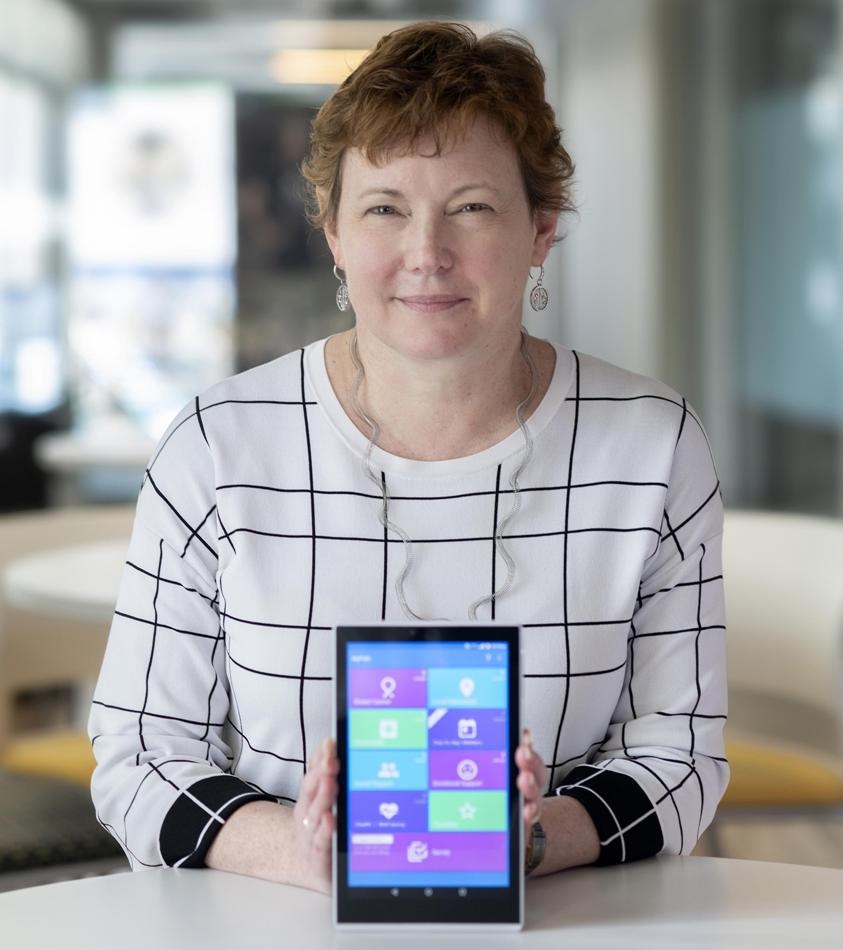Feb 18 2019
In rural Georgia, artificial intelligence has been used to guide and support about 50 breast cancer patients, in the form of an innovative mobile application that offers personalized recommendations to the patients on everything from side effects to insurance.
 Elizabeth Mynatt, executive director of the Georgia Tech Institute for People and Technology and a professor in the Georgia Tech School of Interactive Computing, holds a tablet computer running the MyPath application. (Image credit: Christopher Moore, Georgia Tech)
Elizabeth Mynatt, executive director of the Georgia Tech Institute for People and Technology and a professor in the Georgia Tech School of Interactive Computing, holds a tablet computer running the MyPath application. (Image credit: Christopher Moore, Georgia Tech)
The app, known as MyPath, adapts itself to every stage of a patient’s cancer journey. Therefore, the information available on the app—running on a tablet computer—changes at regular intervals based on the progress of each patient. Is a patient scheduled for surgery? MyPath will tell the patients what they have to know one day earlier.
Patients have told us, ‘It just seemed to magically know what I needed’.
Elizabeth Mynatt, Distinguished Professor, School of Interactive Computing, Georgia Tech
Mynatt, who is also the principal investigator of the study and Executive Director of the Institute for People and Technology, considers MyPath to be the first healthcare app that can be personalized (by means of its AI application) for holistic cancer care. Apart from including the medical data of a patient, the app also deals with a range of other relevant issues such as emotional and social needs.
Mynatt presented the study at the 2019 meeting of the American Association for the Advancement of Science on February 15th, 2019. The study has been funded by the National Cancer Institute, part of the National Institutes of Health, under award RO1 CA195653.
National Recognition
In January 2019, iSchools—a consortium of about 100 institutions from across the globe (including Georgia Tech) devoted to advancing the information field, recognized MyPath. Maia Jacobs, who was recently awarded her PhD from Georgia Tech for her study on MyPath, was announced the winner of the 2019 iSchools Doctoral Dissertation Award.
According to iSchools, “the Award Committee felt [that Jacobs’ work] was timely and important, and lauded its impact in how patients manage their health.” Jacobs, who is now a postdoctoral fellow at Harvard, is currently investigating ways to expand MyPath to other diseases.
The study was also honored in 2016 when it was featured in a report to President Barack Obama by the President’s Cancer Panel. The report, titled “Improving Cancer-Related Outcomes with Connected Health,” aimed to “help patients manage their health information and participate in their own care,” according to a Georgia Tech story at the time.
The Beginning
Six years earlier, Mynatt and her colleagues started working with the Harbin Clinic in Rome, Georgia.
They have a tremendous program in holistic cancer care where they recognize that their patients, who are from a large rural area, face a variety of challenges to be able to successfully navigate the cancer journey.
Elizabeth Mynatt, Distinguished Professor, School of Interactive Computing, Georgia Tech
However, the Harbin doctors and cancer navigators—people who assist patients in their cancer journey—looked for an improved way to stay regularly connected to patients. Specifically, the navigators found that they had the tendency to interact a lot with patients during the diagnosis, but not so much after that. This indicated that despite there being several recommendations for lowering anxiety, for instance, they were not actually being communicated.
According to Mynatt, “We wondered how technology could amplify what these great people are doing.”
How it Works
MyPath starts with a mobile library of resources put together from the American Cancer Society and other esteemed organizations. Subsequently, it is personalized with the diagnosis and treatment plan for each patient, including the dates for particular procedures. In addition, patients complete regular surveys that help inform the system, as well as the caregivers, about their varying symptoms and needs.
The outcome is a system that offers each patient with suggestions and resources targeted to their personal situation. Since MyPath is aware, for example, of the fact that a patient has Stage 2 breast cancer and will be going through a lumpectomy on a particular date, when the patient clicks on the category “Preparing for Surgery,” it suggests relevant articles to prepare the patient for what lies ahead. Has the patient reported nausea in the system’s survey? MyPath will bring the patient’s attention to resources that can assist in combatting the side effect. The system also offers rapid access to contact information for particular caregivers.
Other apps—and the Internet—are not personalized. This means slogging through considerable amounts of technical information that is not relevant to the patient’s situation. On the contrary, “Every day MyPath puts the right resources at your fingertips to help you through your cancer journey,” stated Mynatt.
More than Medical
Some of the most popular features of MyPath bear no direct relation to cancer. Patients regularly consult the buttons for “Day to Day Matters” and “Emotional Support.”
When we asked them about how they used the tablet for healthcare, many patients would talk to us about playing Angry Birds, which they would download to distract them during chemo sessions.
Elizabeth Mynatt, Distinguished Professor, School of Interactive Computing, Georgia Tech
MyPath is the second generation of the app. Feedback of patients for its predecessor, My Journey Compass, resulted in changes including the personalization. Advancement is ongoing. For instance, Mynatt and her team hope to expand the app for use by cancer survivors, who often encounter more challenges such as hormone replacement therapy. The researchers are also working on a version that can be downloaded by individual patients, which would render the app available to many more users.